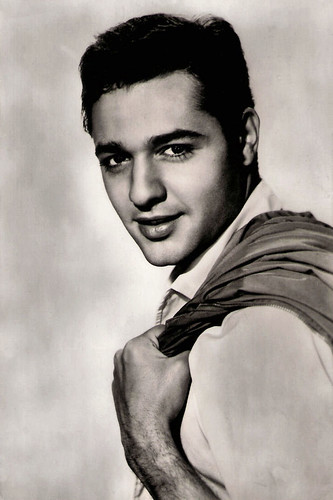
Spanish postcard by Ediciones Raker, Barcelona, no. 289. Photo: Paramount. Publicity still for Escape from Zahrain (Ronald Neame, 1962).
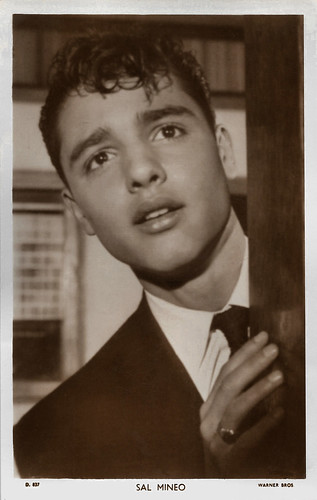
British postcard in the Picturgoer Series, London, no. D. 837. Photo: Warner Bros. Sal Mineo in Rebel Without a Cause (Nicholas Ray, 1955).

British postcard in the Picturegoer Series, London, no. D 770. Photo: Warner Bros. James Dean and Sal Mineo in Rebel Without a Cause (Nicholas Ray, 1955).

British postcard in the Picturegoer Series, London, no. D 968. Photo: Metro-Goldwyn-Mayer.
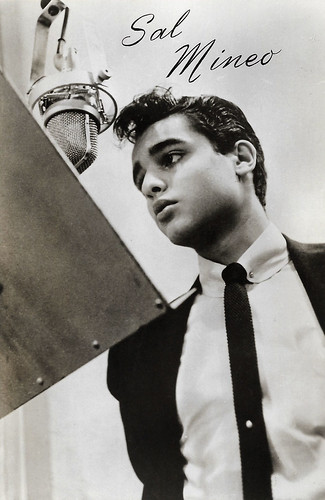
Dutch postcard by Takken, Utrecht, no. 3643.
The Switchblade Kid
Salvatore Mineo Jr. was born in the Bronx, in 1939, as the son of coffin makers Josephine (née Alvisi) and Salvatore Mineo Sr. He was of Sicilian descent; his father was born in Italy and his mother, of Italian origin, was born in the United States. Mineo was the brother of actress Sarina Mineo and actors Michael and Victor Mineo.
He attended the Quintano School for Young Professionals. Mineo's mother enrolled him in dancing and acting school at an early age. He had his first stage appearance in Tennessee Williams' play 'The Rose Tattoo' (1951). He also played the young prince opposite Yul Brynner in the stage musical 'The King and I'. Brynner took the opportunity to help Mineo better himself as an actor.
In 1954, Mineo portrayed the Page, lip-synching to the voice of mezzo-soprano Carol Jones, in the NBC Opera Theatre's production of Richard Strauss's 'Salome', set to Oscar Wilde's play. Elaine Malbin performed the title role, and Peter Herman Adler conducted Kirk Browning's production. As a teenager, Mineo also appeared on ABC's musical quiz program Jukebox Jury.
Mineo made several television appearances before making his screen debut in Six Bridges to Cross (Joseph Pevney, 1955). He beat out Clint Eastwood for the role. Mineo also successfully auditioned for a part in The Private War of Major Benson (1955), as a cadet colonel opposite Charlton Heston.
Mineo's breakthrough as an actor came in Rebel Without a Cause (Nicholas Ray, 1955), in which he played John "Plato" Crawford, a sensitive teenager smitten with the main character Jim Stark (James Dean). Mineo's performance resulted in an Oscar nomination for Best Supporting Actor. Mineo's biographer, Paul Jeffers, recounted that Mineo received thousands of letters from young female fans, was mobbed by them at public appearances.
In Giant (George Stevens, 1956), Mineo played Angel Obregon II, a Mexican boy killed in World War II. Many of his subsequent roles were variations of his role in Rebel Without a Cause, and he was typecast as a troubled teen.
In the Disney adventure Tonka (Lewis R. Forster, 1958), for instance, Mineo starred as a young Sioux named White Bull who traps and domesticates a clear-eyed, spirited wild horse named Tonka that becomes the famous Comanche, the lone survivor of Custer's Last Stand. By the late 1950s, Mineo was a major celebrity. He was sometimes referred to as the "Switchblade Kid", a nickname he earned from his role as a criminal in the film Crime in the Streets (Don Siegel, 1956).
In 1957, Mineo made a brief foray into pop music by recording a handful of songs and an album. Two of his singles reached the Top 40 in the United States' Billboard Hot 100. The more popular of the two, 'Start Movin' (In My Direction)', reached #9 on Billboard's pop chart. It sold over one million copies and was awarded a gold disc. The second was 'Lasting Love', which stayed on the charts for three weeks and reached #27. The singles were followed up by an album on the Epic label.

German collectors card, no. 102. Sal Mineo and Jill Hayworth
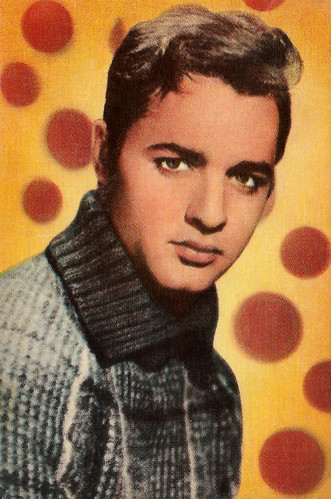
Dutch collectors card in the Rock and Roll Series by School of Dance Joy Amsterdam, no. 10.

Belgian postcard, no. 5030.

Spanish postcard by Archivo Bermejo, no. C-105. Photo: M.G.M. Sal Mineo in Exodus (Otto Preminger, 1960).

Spanish postcard by Raker, no. 1.088. The retail price was 5 Ptas.
Only 37 years old when his life came to this tragic end
In 1959, Sal Mineo starred as the titular jazz drummer in The Gene Krupa Story (Don Weis, 1959), and a year later earned a Golden Globe and his second Oscar nomination for his role as Dov Landau, a Jewish Holocaust survivor, in Exodus (Otto Prerminger, 1960).
Another box office hit was the war epic The Longest Day (Ken Annakin, Andrew Marton, Bernhard Wicki, 1962) in which he was one of the 42 stars. He played a paratrooper killed by a German after the landing in Sainte-Mère-Église.
By then, Mineo was becoming too old to play the type of role that had made him famous, and his rumoured homosexuality led to his being considered inappropriate for leading roles. He had a long, on-and-off relationship with his young Exodus co-star Jill Haworth. She was 15 and he was 21 at the time. In 1972, he came out as bisexual in an interview.
In 1969, expanding his repertoire, Mineo returned to the theatre to direct and star in the gay-themed prison drama 'Fortune and Men's Eyes' with a successful ran in both New York and Los Angeles. He played Rocky, a prison bully who rapes the naive, blond prisoner Smitty, played by the young Don Johnson, pre-Miami Vice.
On-screen he had roles as Red Shirt in the epic Western Cheyenne Autumn (John Ford, 1964) starring Richard Widmark, as Uriah in The Greatest Story Ever Told (George Stevens, 1965), and in his last film role as monkey Dr. Milo in Escape From the Planet of the Apes (Don Taylor, 1971).
On television, he appeared with Henry Fonda in the Western Stranger on the Run (Don Siegel, 1967).
In 1975 he returned to the stage in the San Francisco hit production of 'P.S. Your Cat Is Dead'. Preparing to open the play in Los Angeles with Keir Dullea, he returned home from rehearsal the evening of 12 February 1976 when he was attacked and stabbed to death by a stranger on the streets of West Hollywood. A drug-addled 17-year-old drifter named Lionel Ray Williams was arrested for the crime. He had no idea who Mineo was and was only interested in the money he had on him.
After a trial in 1979, Williams was convicted and sentenced to life in prison for killing Mineo and for committing 10 robberies in the same area. He was paroled in 1990. Easygoing, extroverted Sal Mineo was only 37 years old when his life came to this tragic end. He was laid to rest near his brother Michael Mineo at Gate of Heaven Cemetery in Hawthorne, New York. At the time of his death, he was in a six-year relationship with male actor Courtney Burr III.
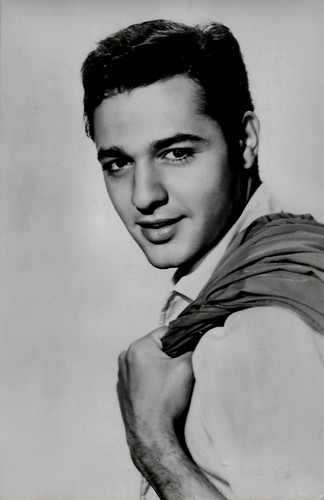
Spanish postcard by Ediciones Raker, Barcelona, no. 289. Photo: Sal Mineo in Escape from Zahrain (Ronald Neame, 1962).
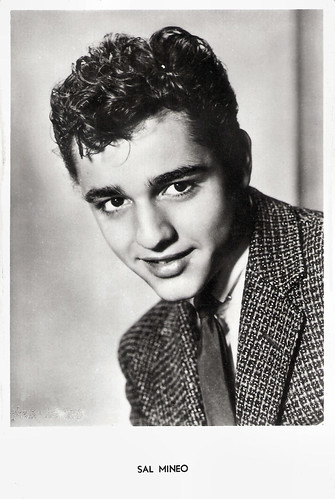
Belgian postcard.

Dutch postcard by Uitg. Takken, Utrecht, no. 3115.

Dutch postcard by Uitg. Takken, Utrecht, no. 3272.

British postcard in the Celebrity Autograph Series by Celebrity Publishers, London, no. 308. Photo: Philips. Caption: Sal Mineo, one of the many stars who can be heard on Philips.
Sources: Jason Ankeny (AllMovie), Anthony Wynn (IMDb), Wikipedia, and IMDb.
No comments:
Post a Comment